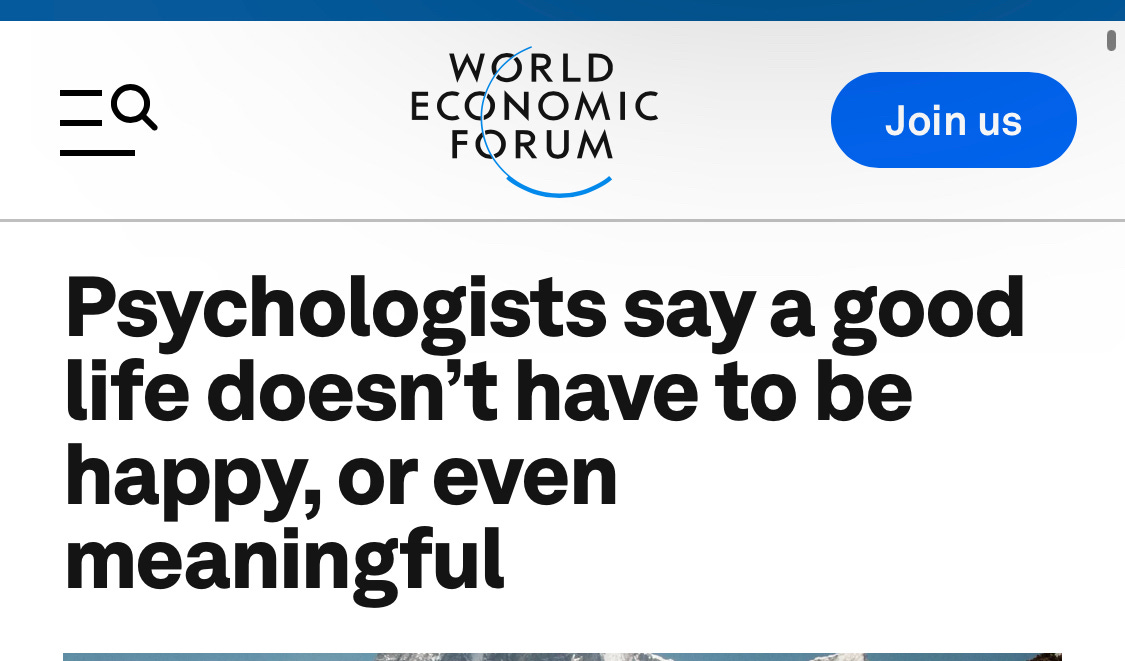The World Economic Forum (WEF), the organization of the “Great Reset” and the prediction that by 2030 you’ll own nothing, have no privacy, and be happy, said in 2021 that a good life doesn’t have to be happy or meaningful! And before you let your common sense or experience of reality get in the way of believing WEF, remember they’re the experts. I mean, experts have never been wrong or lied over the past few years, right?
The WEF, “Psychologists say a good life doesn’t have to be happy, or even meaningful”:
“New research suggests there’s an alternate way to living a good life.
It isn’t focused on happiness or purpose, but rather it’s a life that’s 'psychologically rich'.
A psychologically rich life is one characterized by 'interesting experiences in which novelty and/or complexity are accompanied by profound changes in perspective'.
Studying abroad, for example, is one way that college students often introduce psychological richness into their lives.
What does a good life look like to you? For some, the phrase may conjure up images of a close-knit family, a steady job, and a Victorian house at the end of a street arched with oak trees. Others may focus on the goal of making a difference in the world, whether by working as a nurse or teacher, volunteering, or pouring their energy into environmental activism.
According to Aristotlean theory, the first kind of life would be classified as ‘hedonic’—one based on pleasure, comfort, stability, and strong social relationships. The second is ‘eudaimonic,’ primarily concerned with the sense of purpose and fulfillment one gets by contributing to the greater good. The ancient Greek philosopher outlined these ideas in his treatise Nicomachean Ethics, and the psychological sciences have pretty much stuck them ever since when discussing the possibilities of what people might want out of their time on Earth.
But a new paper, published in the American Psychological Association’s Psychological Review, suggests there’s a another way to live a good life. It isn’t focused on happiness or purpose, but rather it’s a life that’s ‘psychologically rich’. . .
Crucially, an experience doesn’t have to be fun in order to qualify as psychologically enriching. It might even be a hardship. Living through war or a natural disaster might make it hard to feel as though you’re living a particularly happy or purposeful life, but you can still come out of the experience with psychological richness.”
It’s sad that the ancient pagan Aristotle, with all his elitism, sexism, and other flaws, was so much closer to the truth about a good life than moderns living in countries that, until just recently, were officially Christian. Aristotle saw virtue as a necessary part of happiness. I’m guessing the insidious World Economic Forum wouldn’t agree.
The American Psychological Association, which put out the research, also has a history of being quite woke. For instance, APA has called traditional masculinity “oppressive” and “harmful.”
In 2016, WEF outlined a future planned to happen by 2030, openly admitting that people’s every move and word will be recorded and there will nothing that is private anymore. The important thing to remember is that the WEF elites show no sign of intending to change their lives, surrender their property and luxuries, in the future. If someone says you don’t need happiness or meaning in your life, immediately distrust him. Most of the time, he simply means that he wants you to surrender your happiness and meaning to increase his own power, comfort, and control.





Happyness is the only reason to exist you *********. Happyness is positive or neutral feelings. What WEF is arguing is that its okay to suffer (under their disgusting inhumane policies). Gaslighting and pseudo philosophy
Good post to bring to wider attention, replete with the de rigueur nauseatingly twisted, paradoxical, retrospective virtue signalling that belongs in Pseuds Corner of Private Eye:
"It’s sad that the ancient pagan Aristotle, with all his elitism, sexism, and other flaws, was so much closer to the truth about a good life than moderns living in countries that, until just recently, were officially Christian. Aristotle saw virtue as a necessary part of happiness. I’m guessing the insidious World Economic Forum wouldn’t agree."